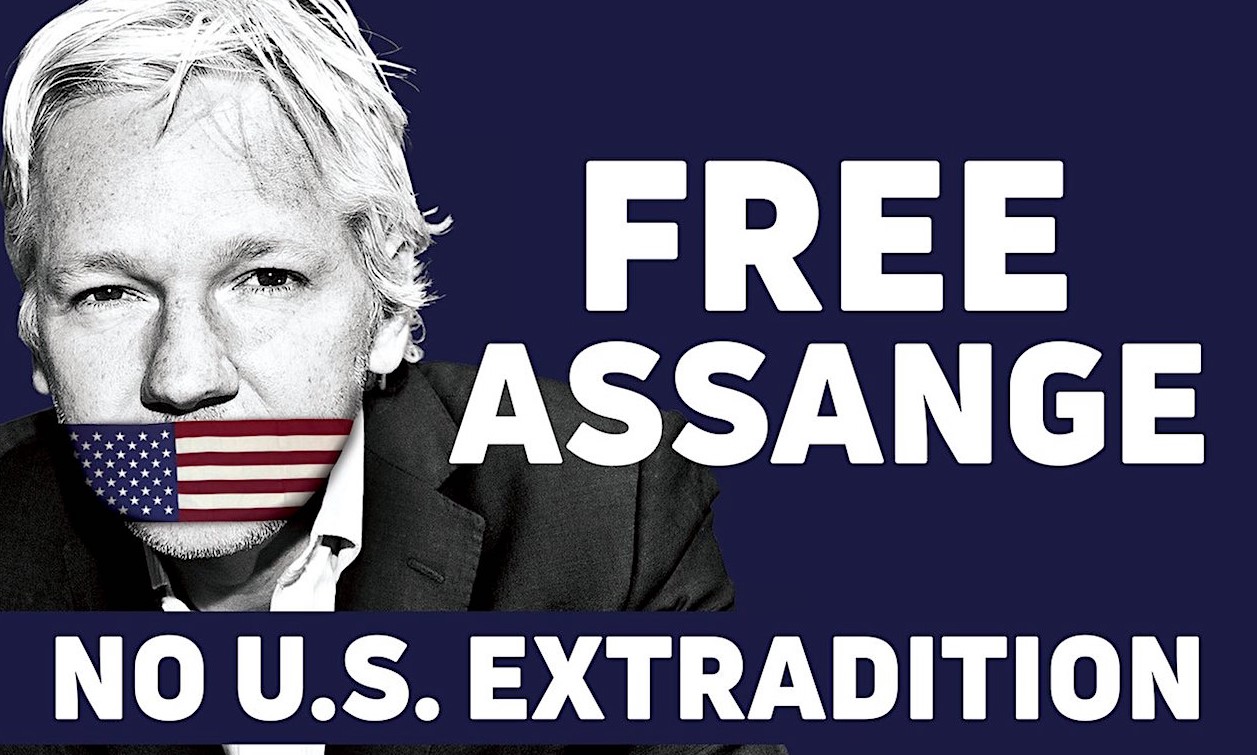-
Stop Extradition of Julian Assange Now!

Julian Assange’s Extradition To US Formally Approved By UK Government reported on June 17 that,
“Julian Assange’s fate has been sealed as UK Home Secretary Priti Patel has formally approved his extradition to the United States, following a years-long legal saga in which the WikiLeaks founder’s legal team has pursued every avenue of the courts and appeal to fight the US request.
Held at London’s Belmarsh prison since his being taken out of the Ecuadoran embassy in April 2019, the 50-year-old Assange is now the closest he’s ever been to being handed over to American custody, where it’s expected he would face US legal proceedings and a likely conviction on multiple spying-related charges, eventually being sent to a federal supermax facility, specifically the ADX Florence Supermax. The Home Office has said in wake of Patel’s ruling that Assange has 14 days to appeal the decision.
It affirmed that the courts found that US extradition would not be ‘incompatible with his human rights’ and crucially that in US custody ‘he will be treated appropriately’ – this after the prior most successful legal challenge his defense mounted hinged on his facing cruel and possibly torturous conditions inside the US prison system, specifically the highly isolated life inside ADX Florence confinement.
Upon Patel’s greenlight, WikiLeaks put out an immediate statement saying it is appealing the ruling: ‘Today is not the end of fight,’ it said. ‘It is only the beginning of a new legal battle. We will appeal through the legal system; the next appeal will be before the high court.’
The statement said anyone who cared about freedom of expression should be “deeply ashamed” that the Home Secretary approved Assange’s extradition. ‘Julian did nothing wrong. He has committed no crime and is not a criminal. He is a journalist and a publisher and he is being punished for doing his job,’ it said. ‘It was in Priti Patel’s power to do the right thing. Instead she will forever be remembered as an accomplice of the United States in its agenda to turn investigative journalism into a criminal enterprise.’
The ruling has provoked outrage among some UK officials and supporters of Assange, including from former cabinet minister David Davis, who said: ‘Sadly, I do not believe Mr Assange will get a fair trial. This extradition treaty needs to be rewritten to give British and American citizens identical rights, unlike now.’
Activists across the globe and political spectrum have argued that the Assange extradition case puts journalism itself on trial, and criminalizes methods used by reporters and newsrooms everywhere. Indeed, for years going back to the original 2010 and 2011 leaks related to US actions in Iran and Afghanistan, mainstream newspapers printed the leaked files in coordination with WikiLeaks.
London’s High Court must give its approval if the extradition is to proceed. The US has insisted that by publishing thousands of pages of classified documents, Assange put American lives in danger…
It’s not clear when Assange will be extradited, but now that the Home Office has signed off, it’s likely he will be moved across the Atlantic to stand trial in the US very soon. That trial will likely be closely covered by the international press, just like every other chapter of Assange’s nearly decade-long legal battle.”
Stella Assange said in a tweet on June 18:
Help Julian!
Dozens of organizations issued new statements condemning Priti Patel’s decision to extradite Assange.
https://dontextraditeassange.com/take-action/ (sign multiple petitions, donate, buy T-shirts, etc.)
The WikiLeaks Shop
Assange’s Wife and Sons
Julian Assange’s Wedding Day and Status shows that on March 23, Assange married Stella Moris, the mother of his two young sons. The wedding took place in the Belmarsh prison where Assange has been held for three years. There was a very limited guest list and no photos were allowed.
Stella, a South African lawyer and legal researcher, joined WikiLeaks in 2011 after its release of documents about Iraq. She said she felt fortunate to meet the person who had changed the world with WikiLeaks. Because her family spent time in Sweden, Stella became a Swedish national and is fluent in Swedish. So, she was able to help litigate Assange’s case in Sweden which was rescinded in 2019. Stella is also fluent in Spanish and facilitated Assange’s seeking asylum in the Ecuadorian Embassy in 2012.
By 2015, Assange and Stella were in love and by 2017, they were engaged. They planned to get married, but he was arrested before that happened. Assange (49) and Stella (38) have two sons: Gabriel (4.5 years) and Max (3 years). Stella is a very powerful spokesperson for Assange. She and their two sons have helped give him a reason to live despite the torturous conditions in prison.
Daddy Leaks: WikiLeaks boss Julian Assange fathers two kids inside Ecuadorian
embassy with lawyer who fell in love with him
Stella Moris on her secret family with Julian Assange: ‘He’s unlike anyone I have ever met’
“Stella Moris with sons Gabriel and Max: ‘I tell them there are some people who don’t want Daddy to come home.’ Photograph: Harry Borden/The Guardian
“What’s it like raising two boys when their father is wanted by the US? The partner of the WikiLeaks founder tells her story. Imagine meeting the love of your life but not being able to tell a soul. Then having his children, and not being able to confide in your closest friends who the father is because it may endanger the family. And finally revealing all to the world – but only to help prevent him being extradited from Belmarsh prison in London to America where he faces a jail sentence of up to 175 years under the Espionage Act.
Stella Moris has had a tough time of it. Her face is pale, her voice little more than a whisper, and she barely makes eye contact. The pauses between words are sometimes so long, you fear she’s having a breakdown mid-sentence. And yet there is such defiance in her language, such certainty in the rightness of her cause. A defiance and certainty not unlike that shown by her fiance, WikiLeaks founder Julian Assange, the world’s most famous publisher of classified information. Now she is fighting for his life and her future.
Moris says there is another reason she couldn’t tell people about her relationship with Assange…. Her story had simply become too fantastical – the kind you might find in a melodramatic spy novel. “I couldn’t explain the situation to friends because my circumstances had become quite unrelatable.” It emerged last April that Moris and Assange had two children while he was in hiding at the embassy. By then, Gabriel was almost three and Max was one. The story came out only because Assange had tried to secure bail with his new family at Moris’s home. Even by Assange’s standards, it was an astonishing revelation. They had managed to keep their relationship from the public for six years….
“I was in an embassy where the authorities were hostile to Julian and threatening to throw him out; where there was a security company secretly working for the CIA; where I was told not to bring my baby in because it wasn’t safe; where my mom was followed. How do you sit down and have a martini and discuss this with your best friends?”….
Stella Moris’s life has changed beyond recognition over the past decade. When she first met Assange in 2011, she was a 28-year-old lawyer known as Sara Gonzalez Devant. She had been excited by the work of WikiLeaks, believing the nonprofit media organisation was exposing corruption and war crimes in a way never seen before. She mentions one of its most famous scoops – a horrifying video called Collateral Murder that showed the crew of two Apache helicopters firing on a group of Iraqi civilians with the callous insouciance of video game players.…
In April 2010, Assange released the video at a press conference in Washington DC. Overnight, WikiLeaks – which he had founded four years previously – became a household name.…
In the case of Collateral Murder, that whistleblower was a US army soldier stationed in Iraq called Bradley Manning (later Chelsea Manning after transitioning). In early 2010, horrified by the behaviour of colleagues, Manning disclosed nearly 750,000 classified, or unclassified but sensitive, military and diplomatic documents to WikiLeaks, including the Afghan war logs, the Iraq war logs and more than 251,000 US state department cables written by 271 American embassies and consulates in 180 countries that became known as Cablegate.
Assange teamed up with five major newspapers (the Guardian, New York Times, Der Spiegel, El Pais and Le Monde) who collaborated on publishing the shocking exposés. This meant they shared the work, the risk and the credit, a way of reporting that is now commonplace with mass leaks, such as the Panama and Pandora papers. As for Manning, she was now in jail. She had confided to a former hacker, who reported her to the US authorities. Three years later, she went on trial, pleaded guilty and was sentenced to 35 years’ imprisonment.
Meanwhile, Assange became a rock star in the rapidly evolving new media world. And he played the part to perfection: bobbed white hair, leather jacket; Jagger-esque swagger. To many, he was a hero – the pugnacious Aussie who gave America a good hiding by revealing what the US military had really got up to in Iraq and Afghanistan. Others regarded him as an egomaniacal information thief. In December 2010, he won the online readers’ vote for Time magazine’s person of the year.
But by then he, too, was in prison. In August 2010, only a few days after WikiLeaks and its media partners started to publish the Afghan war logs, the Swedish prosecutor’s office issued an arrest warrant following allegations from two women, one of rape and one of molestation. Assange said that in both cases the sex was consensual and the allegations were unfounded. After nine days in jail, he was bailed to Ellingham House, the stately home owned by his friend Captain Vaughan Smith, a WikiLeaks supporter who served in the British army before founding the Frontline Club.
Sara Gonzalez Devant first met Assange at Frontline Mews, a property owned by Smith, where Assange initially lived when under house arrest. An expert in international law, she was hired as part of Assange’s legal team to help fight his case against extradition to Sweden. She officially changed her name to Stella Moris in 2012 to protect herself and her family while working with Assange. She chose a common surname (albeit with an unusual spelling) and Stella because she liked it. Nowadays, she says, everybody calls her Stella except her parents.
They found they had much in common. Both were freedom of information champions and had experienced nomadic childhoods. Assange lived in more than 30 Australian towns and attended 37 schools before settling down with his mother and half-brother in Melbourne. She was born in Johannesburg, South Africa, and lived in Botswana, Lesotho, Sweden and Spain before going to university in the UK. Moris’s parents were part of the Medu Art Ensemble, which played a significant role in the struggle against apartheid. Her father, a Swede of Cuban heritage, is an architect/town planner and artist; her mother is Spanish and a theatre director. By chance, Assange’s mother ran a theatre company and his biological father was an architect. “I thought this was a nice coincidence,” Moris says. “It’s not a combination one often comes across.”
Moris attended an international school in Lesotho, which is why she speaks with an American accent today. She did a degree in law and politics at Soas in London, an MSc at Oxford in refugee law, and a master’s in Madrid in public international law. She was a top scholar and in her mid-20s won a place on a prestigious leadership course in Canada. “It is Canada’s equivalent of the Rhodes scholarship,” she says. A year after completing it she went to work with Assange’s legal team.
Moris says she found him fascinating from the off. “He had a very intense gaze. He didn’t do small talk. He wanted to know where I was coming from. The day I met him, we spoke for two hours. I told him about my life. Julian is unlike anyone I have ever met.” Her face lights up; she looks like a teenager in love. “He is very direct, engaging, clever, curious.”
Before even meeting him, she says, she was convinced he was the victim of an elaborate sting. “I had read all the documents and it was clear that this was a political case and that he was innocent. The Swedish authorities were behaving in a way that was inexplicable, refusing to question him. Then it came out that they were being advised by the Crown Prosecution Service not to question him in England. The CPS was pushing for Julian to be extradited, which was also inexplicable.” She shows me a document obtained through a freedom of information request in which a senior CPS lawyer tells his Swedish counterpart “not to get cold feet” over the extradition.
“Why would they do that?” Moris asks. Assange refused to return to Sweden because he believed that he would be more likely to be extradited from there to America, where he would be prosecuted under the Espionage Act.
In May 2012, the UK’s supreme court ruled he should be extradited to Sweden. In June, Assange entered the Ecuadorian embassy, where he could not be arrested because of the international legal protection afforded diplomatic premises, and refused to come out. In doing so, he breached his bail conditions. Two months later, Ecuador granted Assange political asylum, stating that they feared his human rights would be violated if he were extradited….
After Assange entered the embassy in 2012, he and Moris became close. “I spent a lot of time with him. I got to know him,” she says. When did she realise she was falling in love with him? “2014, two years later.” Did she resist it? “Initially, yes, because it made things more complicated. But in the end, no.” Did Assange see the difficulties? “He’s a romantic.” Which is a no. “It’s such a miracle when you do fall in love,” Moris says, “when you find someone you’re compatible with.”…
Media organisations around the world, including the Guardian, have expressed grave concerns about the implications of extraditing Assange. The Guardian has called on Joe Biden to pardon Assange and said the charges against him in the US “undermine the foundations of democracy and press freedom.”



Login or Register to Leave a Comment